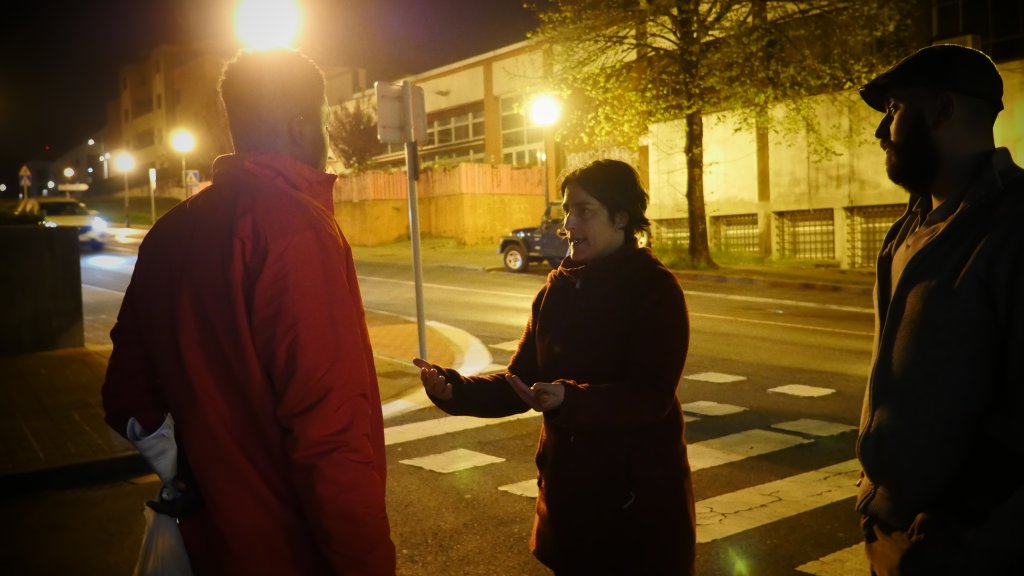Among European countries that have taken increasingly strict migration measures, Spain is an outlier that has opted for a more flexible response. Increasing numbers of migrants are returning there, after previously seeking to live elsewhere. Yet obtaining asylum in Spain remains a long and difficult process.
Alpha goes to the Irùn city hall in Spanish Basque Country whenever he can. He goes to help the volunteers of the association Irungo Harrera Sarea who have an information stand for migrants in transit. It’s also a chance to greet those who advised him one year ago when he was on his way to Paris.
The 22-year-old arrived in the Canary Islands on October 8, 2023, after a week-long crossing in a pirogue (a traditional canoe used for fishing but that are also used to make the crossing from West Africa to the Canary Islands). The 22-year-old traveled through Malaga in southern Spain, than moved north through Irùn, before making his way to France. "I came with a friend. We took a bus to France, but we were arrested. The police sent us back to Spain, but we tried again and finally managed to cross the border by foot," he told InfoMigrants.
Alpha met a volunteer in Hendaye, France, who accompanied him to the reception center "Pausa" in Bayonne. The volunteer told him about Spain's integration policy, prompting the Guinean to decide to return to Spain and try his luck there. He feared being forced to live on the streets, because of a pre-existing thyroid condition.
He finally entered a program run by the Madrid-based Spanish Center for Refugees (CEAR) and took a course provided by an association to become a cook. He obtained his residence permit in March 2025. "Now, I have a home, a job and I have been treated," he said.
Read Also
Spain: More than 4,000 unaccompanied minors to be distributed nationwide
'A new phenomenon'
Thousands of migrants like Alpha who left Spain for other European countries after arriving in the Canary Islands, "are deciding to return", said Oihana, a Basque volunteer, who described it as, "a new phenomenon."
"We reported the situation to the provincial government, so they can notify the national authorities," she adds.
The situation "creates housing problems", said Alpha. The migrants requesting asylum can stay at the Red Cross shelter for ten days, compared to the three days granted to migrants in transit. The association Irungo Harrera Sarea recently discovered a group of eight Malian asylum seekers in the street a few dozen meters away from the Red Cross headquarters. Despite the authorities' messages of openness, the process of obtaining asylum remains lengthy.
Read AlsoSpain's restrictive asylum system: Long waits, low acceptance rates
'Surviving'
In front of the Red Cross offices in Irùn, Seydou* smokes a cigarette with two other exiles. He returned to Spain after more than a year of "surviving" in France, working odd jobs and nights on the capital's sidewalks. He said he now hopes to obtain asylum in Spain too.

Migrants need to be able to file their asylum request before they do anything else. The process in the Basque Country begins with a phone call that can only be made on Mondays between 4 p.m. and 7 p.m. "Everyone calls at the same time during this time slot, and very few get a response," said Alpha. "It can take several months before even getting a response to that phone call," said Oihana, a volunteer with the association, while trying to reassure Seydou. "We call and call, but there's no answer. Except I only have seven days left with the Red Cross," said the Malian.
"Difficulties accessing the procedure are the very first problem that asylum seekers encounter upon arriving here," said Mauricio Valiente, director of CEAR. "The administration – both the asylum offices and the police – is saturated. As a result, migrants are bounced from office to office, and from region to region. Some take a year to even submit their application."
Spain has already received more than 26,400 asylum applications since the beginning of 2025, mostly from Venezuelan, Colombian, and Malian nationals. The asylum office registered a total of 167,366 applications in 2024, compared to 163,000 in 2023, both record-breaking years.
Spain has one of the EU’s lowest approval rates for asylum, with a 12 percent approval rate in 2023. The figure increased slightly to 18.5 percent in 2024, but it remains far below the European average (42 percent), according to a CEAR report. Yet for migrants from certain countries such as Mali, Sudan, and Somalia, acceptance rates exceed 90 percent.
Read AlsoFrance and Morocco move closer in deportation deal
'Strengthening labor immigration'
Those whose asylum applications have been rejected can attempt one last chance: obtaining a residence permit known as "arraigos," reserved for those who can prove they have been in the country for at least two years. This is a way to "strengthen labor immigration" and "reduce asylum applications," said Valiente. As of December 31, 2023, 210,334 people were granted this type of residence permit, which was 85,000 more than in 2022.
"This new policy attracts migrants," said Alpha, who is in regular contact with new arrivals in Irùn. "It's still difficult. Even after a long asylum procedure, the clock is reset, and migrants must therefore wait two years in an irregular situation before being eligible for an arraigo," said Iniaki, a Basque volunteer. In front of Irùn town hall, where he welcomed Alpha upon his return to Spain, he explained to the newly arrived migrants that "they shouldn't think it will be easy here."
"Even if the current policies are milder for migrants than in France, Spain is tough. Europe is tough," he explains.
* Names have been changed at the request of the individuals concerned.
